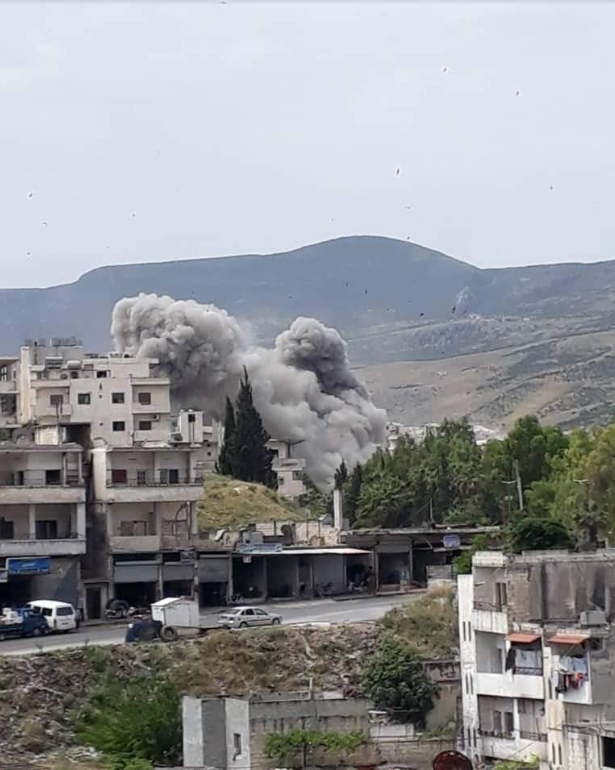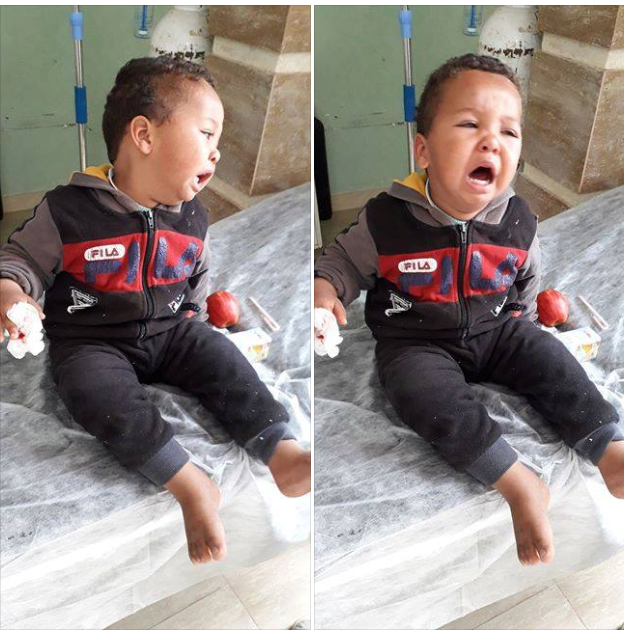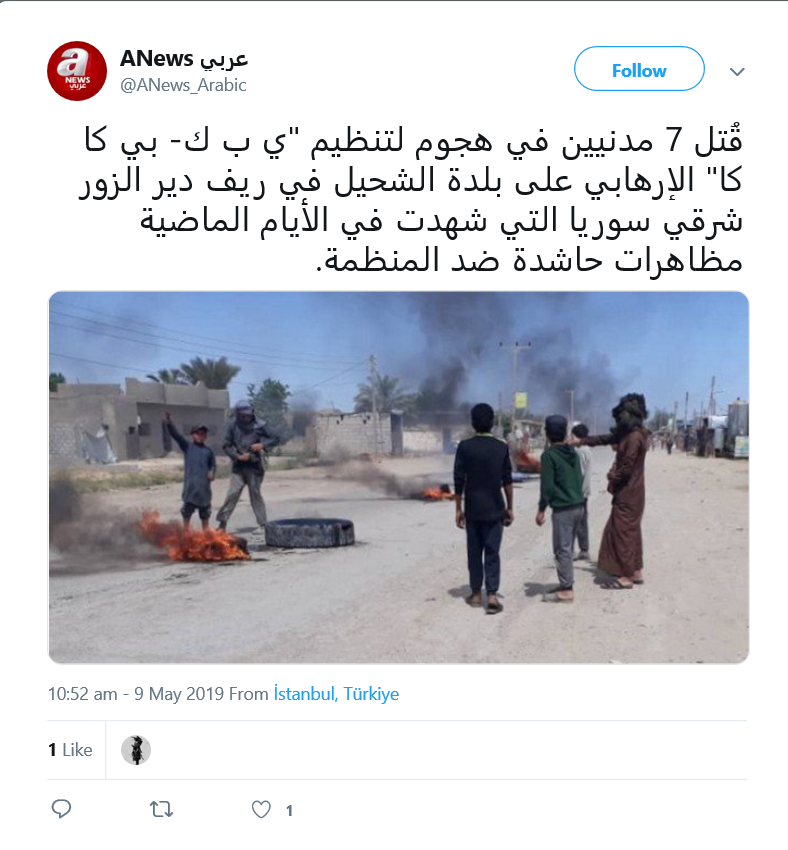Allegations of civilian harm against Moscow were up 300% during May – as Idlib came under fierce attack from the Assad government and its Russian allies.

During May Syrian government forces, supported by Russia, continued to pound rebels in Idlib – leaving in tatters an earlier ceasefire deal brokered by Russia, Turkey and Iran. Many civilians trapped on the ground faced a horrifying ordeal, with Airwars tracking a very significant increase in civilian casualty incidents in Syria reportedly carried out by either Russia or the Assad regime.
Overall, our researchers monitored 105 locally reported civilian casualty events blamed on Russia, a massive 304% rise on April’s 26 incidents – and the highest number of events seen since March 2018, in Eastern Ghouta.
The volume of allegations meant that at time of publication, Airwars was still researching and assessing some of May’s civilian harm incidents. Unrefined estimates show that across these 105 incidents, up to 277 civilians were allegedly killed by Russian and/or regime actions. That figure included up to 70 children and 54 women killed. As many as 459 additional civilians were reportedly injured, some critically.
Almost 80 per cent of May’s incidents were in Idlib governorate, with a further 16% in Hama. Civilian infrastructure came under heavy fire. On May 19th, in an incident which killed up to 10 civilians including as many as six children in Kafaf Nabil, Idlib, Step News reported that multiple airstrikes deliberately “targeted infrastructure and hospitals”, with Halab Today reporting that 15 homes were destroyed. Many sources said that Mariam Maternity Hospital in southern Idlib was out of service as a result of the raid, while Step News alleged the “destruction of the hospital”. Victims included two children named as Ibrahim and Suleiman al Ismail and their pregnant mother.
Footage showing the aftermath of an alleged Russian airstrike on Kafar Nabil, May 19th (via Halab Today TV)
Airwars tracked four separate casualty incidents in the town of Maarat al Numan in Idlib during May. In the worst of these, between 7 and 12 civilians were reportedly killed with up to 40 more wounded in alleged Russian or regime strikes on a popular market in al Masqed al Kabir square, in the middle of the city on May 21st-22nd. According to the Syrian Network for Human Rights, there was also a strike near al Kabir Mosque. Reports were grim, with media activist Ghayath al-Daher telling Geiroon that “most bodies were torn to pieces”. One victim was named as the young boy Mohammad al Shawwaf.

Mohammad al Shawwaf killed in an alleged regime airstrike on Ma’aret al Numan, May 22, 2019 (via SN4HR)
May also saw six casualty events in Aleppo governorate, with four occurring within 24 hours on May 28th. In the most concerning, up to 10 civilians including three children died and as many as 20 more were wounded in an alleged Russia or regime strike on Kafar Halab, local media reported. The White Helmets who were at the scene blamed Russia, and said that high-explosive missiles had struck the market in the middle of the town.

Syrian Civil Defense volunteer putting out a fire caused by an airstrike on Kafar Halab on May 28th (via Syrian Civil Defense).
As the two rival governments continue their struggle for Tripoli, Libya witnessed an increase in the number of strikes compared to April. Airwars monitored reports of 218 airstrikes in May, a 40% rise. Our current estimate is that between 19 and 25 civilians died and 28 to 35 were injured in these incidents, compared to between 37 and 65 killed in April.
The UN-backed Government of National Accord (GNA) was again allegedly responsible for the majority of civilian deaths, reportedly killing between 13 and 16 civilians. Local sources also accused the GNA of being the perpetrator of the month’s worst civilian harm event, on May 14th, when six civilians were reportedly killed by indiscriminate shelling in Qasr Bin Gashir.
The Libyan National Army (LNA) was itself accused of having killed between 3 and 6 civilians through airstrikes, with the most significant event in Zawiya on May 13th.
For the first time during the renewed fighting in Tripoli, civilian harm was also alleged against a foreign actor. Three civilians were reported killed on May 12th in Naser, with local sources accusing of either the LNA, the UAE or Egypt of conducting the strike. Meanwhile, Turkey was again claimed to have been supporting the GNA with drones and military advisors.
Neither competing government managed to make significant territorial gains in May. General Khalifa Haftar rejected international calls for a ceasefire, and vowed to fight until the pro-GNA militias in Tripoli were defeated.

A child injured on May 3rd in the Al Keramia neighbourhood in Janzur by “indiscriminate shelling” (via Field Medicine and Support Center)
No Coalition strikes have been publicly reported in Syria beyond May 4th, and for the second consecutive month, Airwars tracked no civilian harm events assessed as likely caused by US-led Coalition air or artillery strikes in either Iraq or Syria.
There were, however, allegations of civilian harm stemming from a reported counter-terrorism raid in Al Shahil on May 8th. According to local media, at least five people were killed in a three hour operation between midnight and dawn on the city’s al Katef neighbourhood.
The source Deir Ezzor 24 named Haji Khleif Al-Abdullah Al-Othman and his sons Muhammad and Ahmed as among those killed, when they were reportedly shot at by a helicopter hovering over their home. However, Syria.liveuamap said that the victims were not civilians, but members of ISIS. The source claimed that a total of six ISIS members were killed when the Coalition carried out a landing operation in support of SDF ground forces, who were driving armoured vehicles. There was further dispute among other sources as to the the combatant status of the victims.
On May 18th, representatives of the Coalition and the SDF held a meeting with tribal figures and the families of the victims of both the Al Shalil operation, and an incident in Daman on April 24th-25th. According to Deir Ezzor 24, the families called upon the Coalition to provide evidence that their sons were connected to ISIS, questioning the credibility of such claims. Moreover, the source reported that the Coalition stated at the meeting that the victims “had resisted international Coalition forces during the operation.” The families were reportedly unhappy with the Coalition’s explanation of the event, and had called for the perpetrators to be held accountable.

Demonstrations against the SDF in Al-Shahil in Deir al-Zour, after at least six alleged civilians were killed in a joint US-SDF operation on May 8th (via @ANews_Arabic).
Strikes in Iraq have continued, though at a steeply declined rate. Between May 5th and June 3rd, the Coalition said that it had conducted 11 strikes in Iraq, a 73% drop on the 41 strikes reported in the previous four week period. With the Coalition still refusing to provide the locations of these strikes however, it remains impossible to assess whether they might have caused civilian harm.
U.S. Africa Command carried out seven strikes in Somalia during May, up from five in the previous month. It currently assesses that no civilians were harmed in these strikes.
Four of these strikes were on the terror group Al-Shabaab. On May 5th, three alleged terrorists were killed in vicinity of Tortoroow; on May 22nd, a strike on the Lower Shabelle region killed two claimed terrorists; and strikes on May 24th and May 26th, both in the Golis Mountains, killed a total of six alleged al Shabaab fighters.
Additionally, there were three declared US airstrikes on ISIS in Somalia. These were all in the Golis Mountain. The first occurred on May 8th against an ISIS encampment and reportedly killed 13 terrorists. This was followed by another strike the following day (May 9th), killing a further four. The final strike against ISIS was on May 22nd and killed two more alleged members of ISIS.
Despite this ongoing ramp up in airstrikes under the Trump Administration, the US has confirmed responsibility for only two civilian deaths in its secretive war in Somalia. This admission came on April 5th and concerned a strike that occurred on April 1st 2018.
According to CENTCOM, there were no US military strikes against Al Qaeda in the Arabian Peninsula (AQAP) during May. It is unknown whether the CIA separately carried out any attacks.
CENTCOM’s last two declared strikes were in Al Bayda on March 29th. The US military command assessed that no civilians were harmed in either of these actions. In total for 2019, CENTCOM says it has so far conducted eight strikes in Yemen.
However as the Saudi-led air and ground war against Yemen’s Houthi government raged on, civilians remained in extreme danger elsewhere. On May 16th, fresh fighting erupted in the port city of Hodeidah as a UN-backed de-escalation deal broke down, while civilian casualties were also reported in the Houthi-controlled capital, Sana’a.
According to OCHA, in the first quarter of 2019 more than 900 civilian casualties have been reported in Yemen, with Yemenis “More likely to die in their own homes than anywhere else, as a result of war.”
There were no publicly alleged CIA strikes in Pakistan against either Al Qaeda or the Taliban during May.
Along with other NGO partners, Airwars met with US defence officials in Washington DC during May, as part of a continuing dialogue process to secure improvements in civilian harm monitoring, assessments and reporting by the US military.
We also continue to engage with the US-led Coalition on civilian harm allegations resulting from the war against so-called Islamic State. To May 31st, Airwars had tracked up to 29,313 alleged deaths from 2,874 claimed Coalition civilian harm events in Iraq and Syria since 2014. Our own current estimate is of 8,005 to 12,851 civilians likely killed by Coalition actions.
The US-led alliance has itself so far assessed 2,059 of these incidents as ‘non credible’; and a further 302 events as having caused civilian harm. Overall, the Coalition had admitted to at least 1,302 civilians killed by its actions against ISIS, to May 31st 2019.
In its monthly casualty report for May 2019, the Coalition confirmed an additional six events, one of which was an Airwars referral. A further 15 incidents were classed as ‘non credible – with 111 alleged events still in review.
In May, our Netherlands-based conflict researcher and advocacy officer Maike Awater attended the European Forum on Armed Drones (EFAD) in Brussels, a civil society network of organisations working to promote human rights and respect for the rule of law. EFAD was formed in particular to engage on the growing global use of armed drones, and to address key concerns regarding their deployment and proliferation, through engaging with governments, and with European institutions and civil society; and by promoting political and public debate.
Discussing similar topics, Maike also attended a Brussels conference, European Perspectives on Remote Warfare, organized by PAX. A series of panels discussed how emerging military technologies and new security policies are shaping the norms and principles of war.
On May 28th, the Foreign Affairs Committee of the Netherlands Parliament discussed the country’s contribution to the anti-ISIS Coalition in Iraq. During the debate, three political parties – SP, Groenlinks and PvdA – called on the government to release strike data for Dutch airstrikes in the fight against ISIS in Iraq and Syria, for the entire duration of the mission. The parties submitted a total of eleven policy recommendations, to improve monitoring and reporting on civilian casualties from Dutch military actions.
The second panel is covering legal, ethical, and transparency implications of new tech and #remotewar , with @LarryLewis_ from @ElkeSchwarz & @ElenLazarou pic.twitter.com/s1wfquxzJw
— European Forum on Armed Drones (@EFADrones) May 15, 2019
As our new conflict researcher and advocacy officer focused on UK-based advocacy. Dr Chloe Skinner joined Airwars in May from a strong background in academic research and human rights field work.
The last British government policy on protection of civilians during conflicts was published in 2011, and has since lapsed. As the ‘penholder’ on the Protection of Civilians agenda at the UN Security Council, the UK is now poised to update its own strategy in the coming months, with NGOs including Airwars participating in the initial phases of this process.
Alongside many of our partner NGOs, and representatives from the Foreign Office, DFID, and the Ministry of Defence, our Deputy Director Dmytro Chupryna and advocacy officer Chloe Skinner attended two roundtable discussions in May, discussing the UK’s role in the Protection of Civilians, and on concrete steps toward a more comprehensive British strategy.
Airwars emphasised the importance of including civilian casualty recording as a requirement in the forthcoming strategy update, as well as the crucial need for improved assessment processes by the MoD. We will continue to assert that civilian casualty recording must be a baseline requirement in any UK protection of civilians policy – strengthening mechanisms for transparency and accountability, as well as informing a ‘lessons learned’ approach to future conflicts.
Additional reporting: Maike Awater, Abbie Cheeseman, Hanna Rullmann, Osama Mansour, and Chloe Skinner.
Conflict monitoring and assessments (May): Ali Abbas Ahmadi, Maike Awater, Poppy Bowers, Laura Bruun, Abbie Cheeseman, Shihab Halep, Salim Habib, Harry Holmes, Alex Hopkins, Oliver Imhof, Osama Mansour, Hanna Rullmann, Laurie Treffers, Clive Vella, and Anna Zahn.